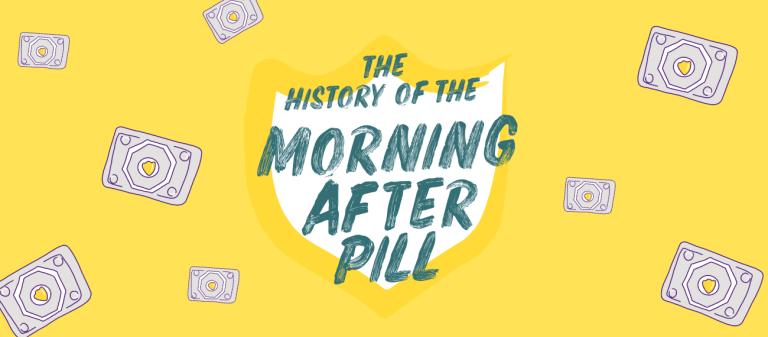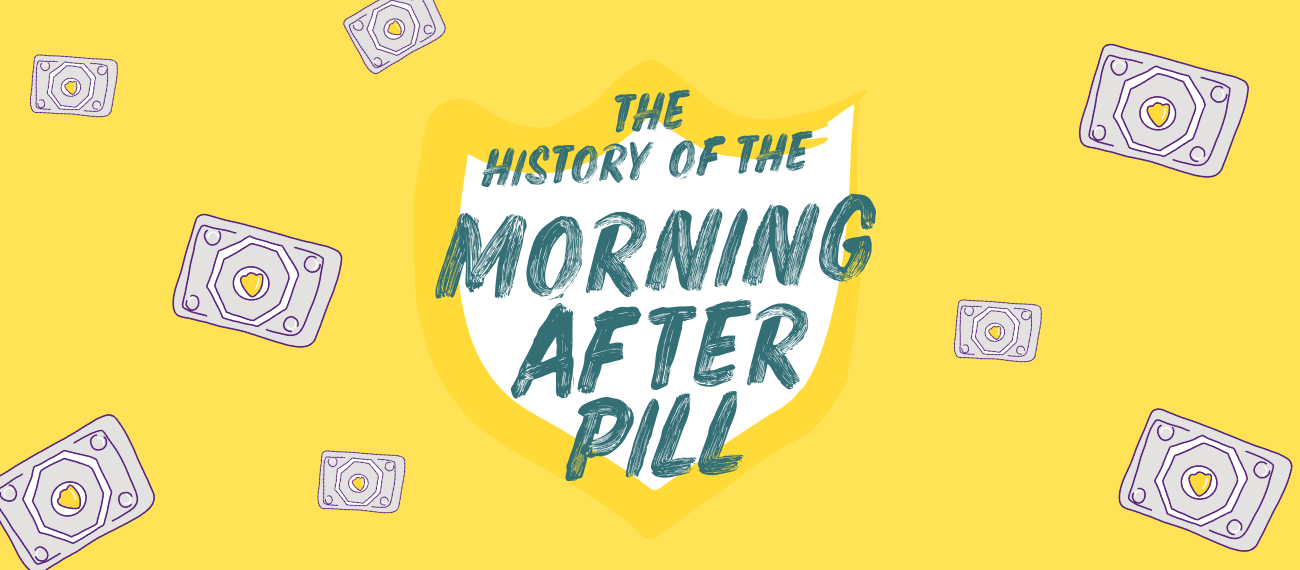The history of the morning after pill
Imagine a world without the option of taking emergency contraception. For most of history, you wouldn’t have had to imagine it. Did you know that hormonal emergency contraception has only been available for 40 years?
Whilst contraceptive pills have been available in the UK since the early 1960s, emergency contraception was only released in 1984. So why did it take so long for the morning after pill to be invented, and what impact did it have on society? Read on to find out.
What is the morning after pill?
Emergency hormonal contraception (also known as the morning after pill) is designed to prevent pregnancy in the event of unprotected sex or contraceptive failure. It works by helping to delay ovulation, so no egg is released and any sperm which has entered the body will have time to die off.
The morning after pill only works by delaying ovulation. It won’t prevent implantation, and it does not cause an abortion or interrupt an existing pregnancy. If ovulation has happened, the morning after pill will not be effective.
Emergency contraceptive pills are intended for emergency use only and should not be used as a regular contraceptive method. They also do not protect against sexually transmitted infections.
Emergency contraception history
The first studies on the effects of oestrogen and progestogen on preventing pregnancy in animals were carried out in the 1920s, primarily on dogs and horses who were mating against the will of their owners.
Clinical trials on humans to test early versions of the morning after pill in the UK started in the 1970s, which were then released and made available in pharmacies in 1984. Early forms of morning after pill were typically taken in two doses a few hours apart, whereas now it’s just one pill that you take ASAP after unprotected sex. The Intrauterine device (IUD, also sometimes called the copper coil) was developed in the late ‘70s.
Early versions of hormonal emergency contraception contained high levels of oestrogen and were taken over 5 days to help prevent unplanned pregnancy following unprotected sex or contraceptive failure. These pills tended to have side effects due in part to their high oestrogen content. Researchers soon decided that emergency contraceptive pills containing progestogen rather than combining oestrogen and progestogen were safer. Levonorgestrel, a hormone-based medication used in some contraceptive pills and emergency contraception, became available to buy in the UK in 2001. Morning after pills containing levonorgestrel are effective for up to 72 hours (3 days) after unprotected sex.
Ulipristal acetate, a selective progesterone receptor modulator, has been approved for use as an emergency contraceptive in Europe since 2009 and in the US since 2010. Unlike morning after pills containing levonorgestrel, ulipristal acetate is effective for up to 5 days (120 hours) after unprotected sex. Ulipristal acetate is 2.5x more effective than levonorgestrel when taken within 24 hours of unprotected sex.*
ellaOne® is a morning after pill available in the U.K which contains the active ingredient ulipristal acetate. ellaOne is the UK’s most popular morning after pill* and can be purchased from pharmacies and online via ellaOne Direct.
*Based on sales data. Verify at ellaone.co.uk/verify
“Hormonal emergency contraception (EHC or known as the ‘morning after pill’) has been available in the U.K for nearly 40 years,” says Deborah Evans, a pharmacist with over 30 years of experience.*
“The availability of the EHC has been significant to give women and people with uteruses another option. Condoms can break, people may miss their pill and unprotected sex happens. If someone doesn’t want to get pregnant, there are options that can help prevent that from happening, including using them for up to 120 hours after sex. As a woman, mother and pharmacist, I’m delighted this option exists and is available to help give women more autonomy over their reproductive health. When EHC became available from pharmacies it was a landmark in sexual healthcare for women; having walk-in access to this option, and then more recently to the progestogen only pill, without prescription has given women the rightful empowerment of their bodies.”
Case study: The morning after pill in 1993, as documented by the New York Times
An article from the New York Times published in 1993 called the morning after pill a ‘well kept secret’ and highlights how little was still known about the product. The morning after pill they focus on is RU-486, an early generation hormonal contraceptive with negative side effects which are well highlighted in the piece. In 1990, the national medical committee of the Planned Parenthood Federation of America had just agreed to allow its affiliates to dispense the morning after pill – and about half of the clinics were doing so at the time of writing.
The condom broke.
The diaphragm dislodged.
He didn’t use anything.
And now she is panicking, mentally flipping through the pages of a calendar: when is her period due?
What she most likely does not know is that she still has time to prevent an unintended pregnancy — that there is indeed something called postcoital contraception obtainable in the United States. It is not a contradiction in terms. Nor do most people consider it doublespeak for abortion…
Although widely prescribed on college campuses, it is largely unknown to teenagers and to women in their 30’s and 40’s. And for those women who get their gynecological care at clinics that rely on Federal funds, it is, by Federal regulation, simply not available. The so-called morning-after pill has probably been the best-kept contraceptive secret in America.
The article also takes a closer look at Felicia Stewart, a female doctor working in a private practice clinic, and explores how she viewed emergency contraception and her attitude towards her patients.
Although Stewart’s recent article in Family Planning Perspectives argues for wide availability of the morning-after pill, she takes exception to the term: “I don’t like the name ‘morning after,’ ” she says. “It implies regret, or that you made a decision you didn’t intend, when maybe it was just that technology failed you: a condom broke when you were having sex with your beloved husband of 10 years.” She and her co-authors prefer “emergency contraceptive pills.”
The article highlights the lack of awareness about emergency contraceptive pills at the time, as well as the concern that the morning after pill would ‘distract’ women from asking their partners to use a condom and thus put themselves at risk of HIV, which was still relatively new and deadly at the time.
“Look, people’s lives are people’s lives, and some of them can’t cope or be as organised as some of us might like,” said Stewart. “But it’s only in the area of sex that we get involved in the ethics of promoting risk-taking, the idea that we should withhold information or devices because we don’t want people to need them. Would you make the same argument about cholesterol drugs? Saying, ‘If we give people a drug that will reduce cholesterol, they won’t be as likely to exercise and eat properly like they really should?’”
The article ends with a forward look to the future – a world where the morning after pill is openly discussed:
She began to daydream aloud. “Once it becomes openly discussed, though, once Oprah and Sally Jessy put it on their shows, and people feel comfortable with the notion, then they can come to us and say, ‘I heard about this morning-after pill — can you help me get it?’ “
The future of the morning after pill
Fast forward to today and things are very different, although there is still a lot of misunderstanding around emergency contraception, what it is and how it works. Over half of respondents had heard that the morning after pill causes an abortion, and 47% have heard that it makes you infertile if you use it too many times. Both of these statements are not true, but these myths are able to persist because there is still a lack of public awareness around what emergency contraception actually is and how it works.
A study carried out by ellaOne in 2019** found that less than half of people they surveyed had learned about the morning after pill during school sex education, and 43% said the morning after pill was ‘only briefly mentioned’ when they were taught about it. We believe it’s never too late to get a good sex education, and so we are dedicated to spreading accurate, medically backed informative articles around sex, contraception and the morning after pill to answer your questions and empower you with knowledge.
We also know that there is still a lingering shame and stigma surrounding emergency contraception, and that people can still feel judged and embarrassed when accessing it. There is nothing wrong with having sex, and sometimes accidents happen. We want to live in a world where the choices people make about whether or not they have children are respected, and where sex is not seen as a shameful thing.
We believe this is possible, but we need your help to end the stigma around emergency contraception. If you have taken the morning after pill, share your story by clicking the button below and help reassure others that may need to feel less alone.
*Deborah Evans does not endorse any products or brands.
ellaOne® 30mg film-coated tablet contains ulipristal acetate and is indicated for emergency contraception within 120 hours (5 days) of unprotected sexual intercourse or contraceptive failure.
References
https://www.nytimes.com/1993/01/10/magazine/the-morning-after-pill-a-well-kept-secret.html
https://www.ncbi.nlm.nih.gov/pmc/articles/PMC3138379/
https://www.drfelix.co.uk/health-center/the-history-of-the-morning-after-pill/
https://journals.sagepub.com/doi/10.2217/WHE.10.63
https://www.sciencedirect.com/science/article/abs/pii/S1521693416301432
https://www.ncbi.nlm.nih.gov/pmc/articles/PMC3117403/
https://academic.oup.com/edrv/article/41/5/bnaa012/5828992
https://www.cecinfo.org/hra-pharma-launches-ellaone-in-europe/
https://onlinedoctor.lloydspharmacy.com/uk/contraception-advice/history-morning-after-pill
**Study of over 1,000 18-35 year olds carried out by Censuswide on behalf of ellaOne, 2019.




